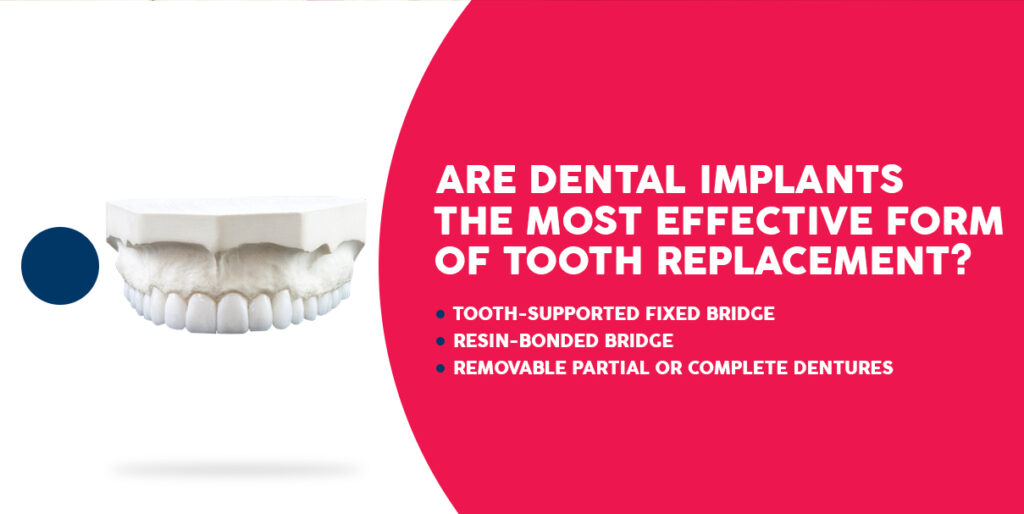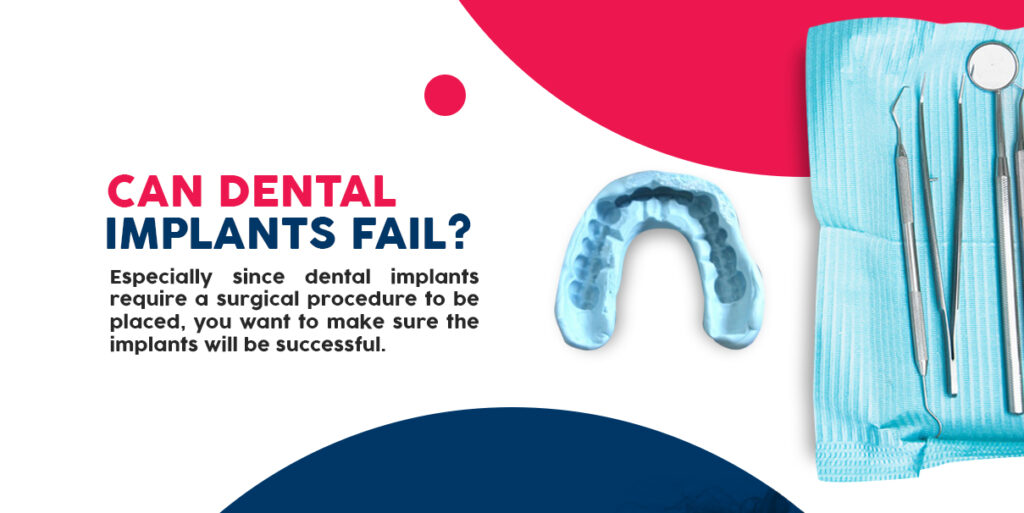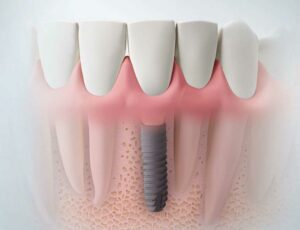Dental implants are a tooth replacement option that involves placing artificial tooth roots into a patient’s jaw and attaching replacement teeth to this base. Though dental implants are not as common as options like dentures or crown or bridge replacements, approximately 3 million people in the U.S. currently have implants, and that number is increasing annually by about 500,000 people.
With the rising popularity of dental implants, many patients and dental professionals may be curious about the merits of this tooth replacement option. If you’re considering getting dental implants for yourself or offering it to your patients, you likely have some questions. The most important one you’re probably asking yourself is whether dental implants are really effective. After all, you may have heard that getting them can be complicated or expensive, so naturally, you want to know whether dental implants are really worth it.
We can measure effectiveness in many ways, including longevity, cost, feel and more. In this article, we’ll take a look at the various factors you need to consider to make a final call on whether dental implants are an effective form of tooth replacement. As you’ll see, across all of these factors, dental implants have been proven to be an excellent tooth replacement option.
Are Dental Implants the Most Effective Form of Tooth Replacement?
You may be wondering how dental implants stack up against other tooth replacement options, like bridges or dentures. While dental implants certainly aren’t your only option, they are the most effective form of tooth replacement. Their documented success rate is higher than any other type of tooth replacement.

Here’s what makes dental implants unique compared to other forms of tooth replacement — implants can actually fuse with bone and integrate seamlessly into your jaw, making them the best way to replicate natural teeth.
Here is how implants compare to some other common forms of tooth replacements:
- Tooth-Supported Fixed Bridge: If you’re missing just one tooth, then tooth-supported fixed bridges are a common solution. The issue with this option is that it involves grinding off parts of the healthy adjacent teeth so they can support the bridge. In addition to damaging healthy teeth, you also risk the bone beneath the bridge deteriorating over time. Perhaps the most significant issue is that bridges are difficult to floss, so decay around the bridge is likely to occur. Because of this, bridges tend to only last five to 10 years before they fail.
- Resin-Bonded Bridge: If you’re missing a front tooth or front teeth, then you could get a resin-bonded bridge that attaches to the adjacent teeth with wings. With this option, there is no need for grinding down healthy teeth. While this option mimics real teeth better than a removable denture, it is weaker than fixed bridgework and is not a suitable long-term solution.
- Removable Partial or Complete Dentures: Dentures are an inexpensive option that doesn’t require grinding down adjacent teeth. The issue with dentures, though, is that they can look and feel unnatural and may cause you discomfort. They can even interfere with speaking and eating. Also, like with bridges, your bone underneath the partial dentures is susceptible to deterioration over time, and partial dentures can cause the adjacent teeth to loosen over time. You usually need to replace dentures after about seven to 15 years. Although they are initially inexpensive, the cost can add up over time.
As you can see, other tooth replacement options can be problematic in a number of ways. Are dental implants the most effective option? In a word, yes. In the following sections, we’ll outline the advantages of dental implants in more detail.
Can Dental Implants Fail?
Especially since dental implants require a surgical procedure to be placed, you want to make sure the implants will be successful. The good news is that dental implants have an extremely high success rate with very little chance that they will fail. The effectiveness of dental implants to survive without any issue has been shown across various clinical studies.

In the past, some studies showed an implant survival rate of 95.5 percent one year after being placed. However, more recent studies have shown an even higher success rate. A 2010 study followed up with 340 patients a year after having a collective total of 1246 dental implants placed. The study showed that only 15 of the participants had lost a total of 17 implants, making the overall implant survival rate 98.6 percent.
Another recent study that followed 106 patients who had all had one implant placed found that, after three years, only one person’s implant failed. A third study involved a large group of researchers in Europe and the U.S. who followed 538 patients with a total of 908 implants. In this study, implants had a survival rate of 98.5 percent one year after placement. Both of these studies also demonstrated that patients generally maintained a very stable bone level after having implants placed.
Do Dental Implants Last Forever?
When determining whether dental implants are the best tooth replacement option, you should consider the long-term effectiveness of dental implants. When it comes to longevity, dental implants have a real advantage over other tooth replacement options. While it may not always be accurate to say they last forever, unlike other tooth replacement options, implants are designed to last a lifetime.
The current body of research shows that 95 to 98 percent of dental implants last for more than 50 years. So, for most people, they will never have to worry about replacing dental implants. This stands in stark contrast to other tooth replacement options, especially bridges, which you’ll typically need to replace after 10 years — and maybe sooner.
Just like with real teeth, proper care is an essential factor when it comes to longevity. Using good oral hygiene at home and attending maintenance visits with the dentist periodically can contribute to the long-term success of dental implants.
Are Dental Implants Cost-Effective?
So, we’ve established that dental implants are effective in that they have a high success rate and can last for a very long time, but are they cost-effective? A single dental implant typically costs between $4300 and $6500. Especially if you need more than one implant, the cost may seem high. Though the initial cost of dental implants can be higher than other tooth replacement options, in the long run, the up-front investment pays off.
In 2013, a group of researchers published a literature review that synthesized 14 studies on dental implants. These researchers came away with the conclusion that, compared to traditional fixed dental prostheses like crowns and bridges, dental implants were shown to be a more cost-effective option. They also found that patients who had dental implants placed were satisfied with their results, even when the initial cost was high. This review further revealed that many patients’ overall health improved after having dental implants, thereby decreasing their healthcare costs.
The fact that other tooth replacement options are not made to last long-term means you’ll have to pay again and again to replace them. As we’ve established, dental implants are made to last, so most patients will never have to deal with any replacement costs. Plus, dental insurance can help to lower the cost of having implants placed. It is uncommon for insurance to cover the whole implant process, but it may cover part of the price for each stage of the procedure.
What Are the Negative Effects of Dental Implants?

Dental implants are better for your bone structure and oral health than other forms of tooth replacement. However, as with any surgical procedure, having dental implants placed does come with some potential complications, such as:
- Infection: When you have anything surgically inserted into your body, there is the potential for infection. If bacteria collects around the implant, this can cause disease and prevent the implant from fusing with the bone as it should. This is why it’s essential to maintain excellent oral hygiene after having implants placed.
- Gum Damage: There is also a chance your gum tissue will be affected by the placement of an implant. Especially if you have severe gum disease already, you run the risk of needing a gum graft to cover up areas where your gum does not cover the implant. This risk is mostly just aesthetic.
- Nerve Damage: Another potential complication from dental implants is nerve damage. During or after the dental implant procedure, nerves can become damaged, which may call for removing the implant to restore nerve function.
If you have implants placed and notice issues after the initial healing process is completed, you should contact your dentist or oral surgeon. These issues include implants feeling loose, inflammation or pain from the implants or a bad taste in your mouth. Overall, having dental implants placed is a relatively low-risk procedure that tends to yield fantastic results.
How Long Does It Take to Get a Dental Implant?
If you want a fast solution to replace missing teeth, then you may want to know how long it takes to get a dental implant. The answer to this question depends on a variety of factors. One factor is whether you need any preparatory procedures such as a bone graft or sinus lift before you can have implants placed. This, of course, will add to the total length of time it takes to get implants as it will delay your placement surgery.
You can find out about your eligibility for dental implants by meeting with your dentist first. Your dentist will refer you to an oral surgeon who will assess you further, let you know if you need a preparatory procedure like a bone graft, and come up with a treatment plan. If your jaw bone and gums are healthy, then you can have your implants placed right away.
The bulk of the time the whole process requires is spent on planning. The surgery itself is very brief. It typically only takes about an hour to place a single implant. Depending on the level of planning or preparatory procedures required, the whole process can take up to nine months— and it could take far less time than that. Once the process is complete, you can rest easy that, with proper care, your implant will last indefinitely.
Is It Painful to Get a Dental Implant, and How Long Do Dental Implants Take to Heal?
When you’re undergoing the procedure, you will receive local anesthesia, so you shouldn’t experience any pain. After the procedure, as with any surgical procedure, you could experience some bruising, swelling or discomfort, but not significant pain. Because it’s an oral procedure, you may also experience some light bleeding. Many patients are pleasantly surprised by how easy the recovery process is. Most patients do not even need prescription pain medication after the surgery, and some people have no trouble returning to work the very next day.
Remember, everyone is different. If your unique situation requires additional procedures to get dental implants, they may involve more time or discomfort as part of the recovery process. In most cases, though, getting dental implants entails a very quick and comfortable recovery for the patient.
Do Dental Implants Feel Natural?
Dental implants certainly look natural, but how do they feel? Overall, dental implants feel more natural than other types of tooth replacement. For example, dentures tend to move around when you eat or speak and need to be taken out periodically, so you are constantly reminded they are not your real teeth. In contrast, implants are seamlessly integrated into your smile and can feel much like natural teeth. It’s also important to note that, even though implants are made of metal, they do not leave a metallic taste in your mouth.
The only difference is that your natural teeth have nerves that allow you to feel sensations from temperature or pressure, and implants do not. Even though implants mimic the way your natural teeth have roots, the implants are still artificial, so they can’t allow you to feel sensations you would in a natural tooth root. Still, you have nerves in the gum tissue all around the implant which can help provide the sensory input for the implant.
The Importance of High-Quality Implants
Dental implants are a uniquely effective option for patients who need a high-quality form of tooth replacement. Their longevity, cost-effectiveness, natural feel and other factors attest to the overall effectiveness of dental implants. If you’re interested in getting dental implants or offering them to your patients, you may want to learn more about the different types of dental implants or other factors you or your patients may want to consider before choosing to get dental implants.
If you want to get the most out of your dental implant experience, then you should be sure to get the highest-quality implants. Dental implants are a long-term investment made to last a lifetime, so invest in the best. Hiossen® Implants is a leading dental implant company dedicated to providing dental implants that are exceptionally innovative, safe, high-quality and effective. We are also committed to educating the public and providing training to dental professionals on dental implants.
If you’re interested in learning more about our products or educational resources, contact us today! One of our representatives would be happy to talk with you and answer any lingering questions you may have about the effectiveness of dental implants.





